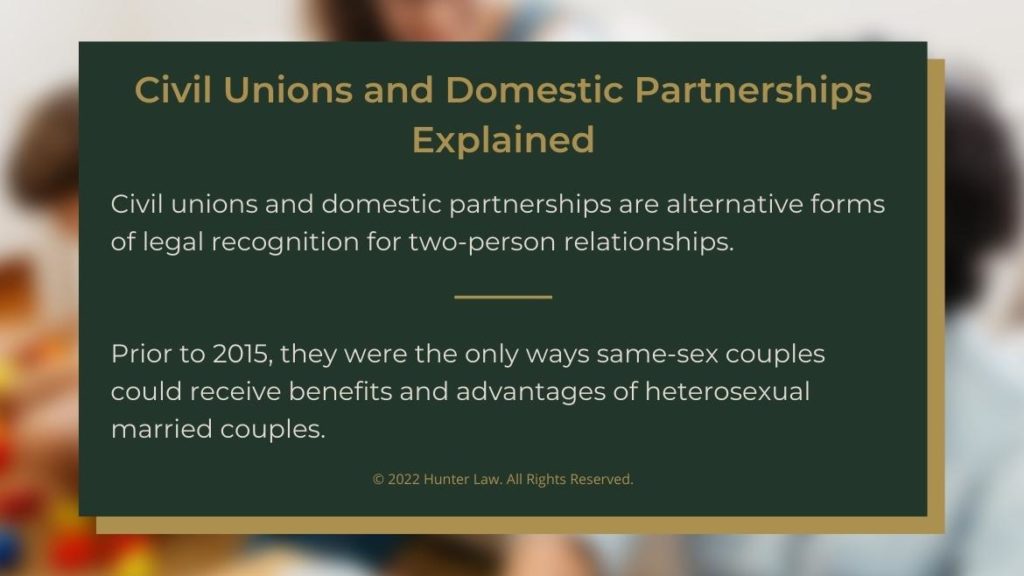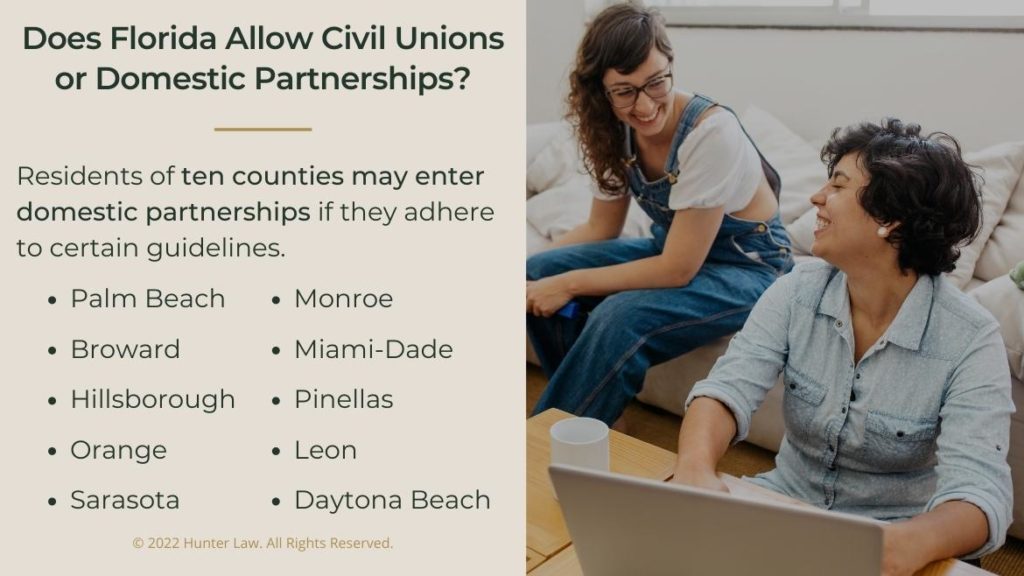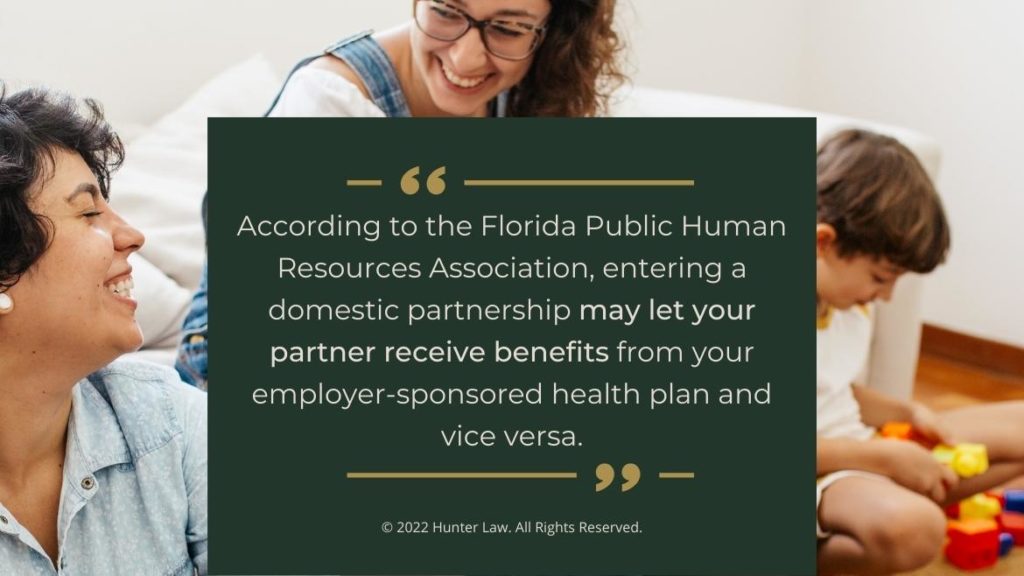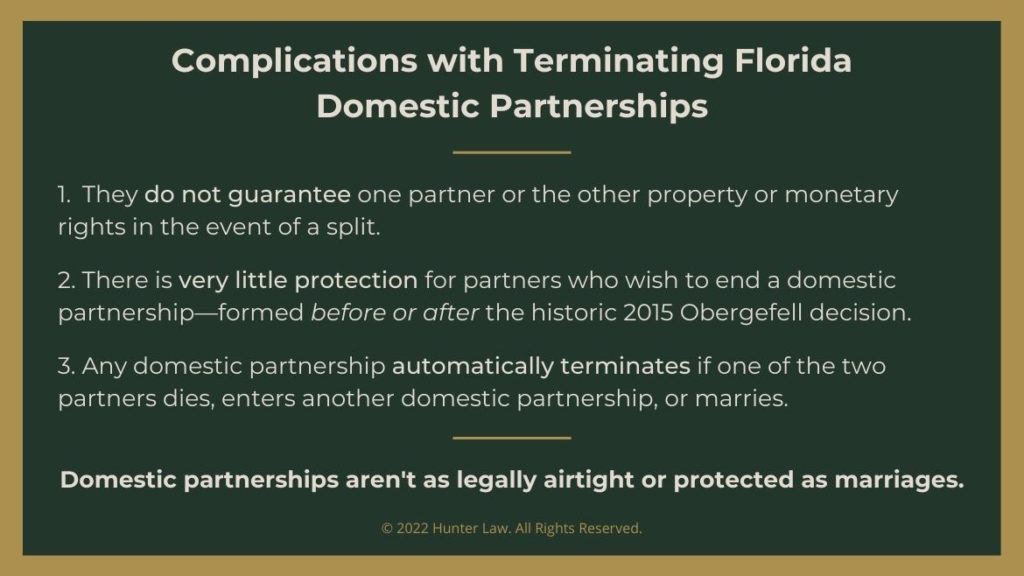Same-sex marriage has been legal in Florida for several years, ever since a historic 2015 Supreme Court decision. However, before that decision and after, many couples, both same-sex and otherwise, have engaged in long-term relationships without getting married. These couples may wish to investigate civil unions and domestic partnerships in Florida.
But before trying to change your legal status to either of these, you need to know how civil unions and domestic partnerships in Florida work and what complications may arise should the relationship end in the future.
Civil Unions and Domestic Partnerships Explained
Both civil unions and domestic partnerships are alternative forms of legal recognition for two-person relationships. They are oftentimes compared to marriage since, depending on your state of residence, they may impart certain legal benefits or entitlement to another’s property.
For many years prior to the 2015 Supreme Court decision for Obergefell vs. Hodges, civil unions and domestic partnerships were the only ways same-sex couples could receive some of the benefits and advantages of heterosexual married couples.
Therefore, before this historic Supreme Court decision, many same-sex couples attempted to get civil unions and domestic partnerships in the state of Florida.
Does Florida Allow Civil Unions or Domestic Partnerships?
Largely, no. Florida does not allow civil unions under any circumstances. The only states that recognize civil unions are Colorado, Hawaii, Illinois, and New Jersey.
However, there are a few exceptions in terms of domestic partnerships for Florida residents. Florida doesn’t have any statewide laws governing domestic partnerships or civil unions, leaving the decision up to each county or city in the state.
At the time of this writing, residents of ten counties in total may enter domestic partnerships in Florida if they adhere to certain guidelines. These counties are:
- Palm Beach
- Monroe
- Broward
- Miami-Dade
- Hillsborough
- Pinellas
- Orange
- Leon
- Sarasota
- Daytona Beach
Other Florida counties do not recognize domestic partnerships, so there is no paperwork to fill out and no legal privileges or benefits.
However, most long-term couples opt to become married if they wish to attain certain legal rights and privileges. Since the 2015 decision mentioned above, same-sex marriage has been legal in Florida. That decision noted that no Florida city or county could deny marriage rights to same-sex couples.
Do Members of Long-Term Relationships Have Rights in Florida?
Not unless they are married or they are in an official domestic partnership in one of the above-mentioned ten counties. Prior to 1968, some cities in Florida recognized long-term relationships as “common-law marriages” without requiring an official marriage ceremony.
These common-law marriages did award certain rights and privileges to members engaged in those relationships. However, after 1968, this practice was abolished, limiting rights and privileges to marriages exclusively.
Although same-sex marriage is now legal in Florida, most other forms of long-term relationships do not award any rights or advantages.
Domestic Partnerships in Florida
Those who live in Broward, Hillsborough, Monroe, and other counties may enter domestic partnerships rather than becoming married. You and your partner must meet the following guidelines to qualify for this change in status:
- Be over the age of 18
- Not be related by blood
- Be residents of one of the ten counties above
- Not be currently married or involved in any other partnership
Entering a domestic partnership in one of these counties may provide your relationship with certain advantages. These include:
- Both members receive access to healthcare information, as well as being authorized to visit each other and make decisions on the other’s behalf at healthcare facilities under some circumstances
- Both members receive visitation rights for a partner incarcerated at a county detention facility
- The right to be listed as “next of kin” for emergency purposes
- The to be listed as a decedent for your partner in the event of your death for funeral and related services
Furthermore, according to the Florida Public Human Resources Association, entering a domestic partnership in Florida may let your partner receive benefits from your employer-sponsored health plan and vice versa.
Complications with Terminating Florida Domestic Partnerships
While domestic partnerships were very useful for same-sex couples in the past, and may still be appropriate for specific circumstances today, they do carry some potential complications.
For example, they do not guarantee one partner or the other property or monetary rights in the event of a split. If one partner makes significantly more than another, for instance, and the relationship ends, the second partner is not entitled to alimony to maintain their standard of living.
Furthermore, all domestic partnerships (formed before or after the Obergefell decision) are governed by Ordinance 2006-002. Under this ordinance, there is very little protection for partners who wish to end the union.
To end a domestic partnership in Broward County, Hillsborough County, or one of the other allowing counties, one partner in the couple needs to notify the County Clerk and Comptroller, plus file a Declaration of Termination of Domestic Partnership.
Furthermore, any domestic partnership automatically terminates if one of the two partners dies, enters another domestic partnership, or marries.
Put another way, domestic partnerships are not as legally airtight or protected as marriages. Therefore, terminating your domestic partnership could lead to complications such as:
- Being unable to receive property or money that would otherwise legally be yours
- Being unable to negotiate child support or child visitation rights
- Being unable to resolve other child custody disputes
- And more
Contact Tampa Family Law Attorneys Today
Because domestic partnerships can be very complicated when they end, it’s important to form a properly drafted legal agreement to address various issues, like child support, joint property ownership, and much more. Knowledgeable family law attorneys such as Hunter Law may be able to help.
As experienced lawyers who’ve operated in the Tampa area for many years, we are well-equipped and ready to assist with your arbitration or lawsuit case. Specifically, we can:
- Help you reach a reasonable agreement with your ex-partner regarding child support, property ownership, and finances
- Advocate for you as your domestic partnership ends
- Draft a legal agreement to ensure that property is distributed appropriately and fairly to both parties
- And more
The end of any relationship can be difficult. But you don’t have to face it alone. Contact Hunter Law today.






